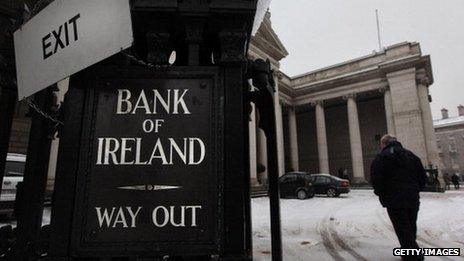Ireland's tough economic policies to continue, says finance minister
- Published

The Irish economy is now emerging from one of the deepest recessions in the eurozone.
The Irish Republic's exit from its bailout rescue is a "milestone" but not the end of the road, the country's finance minister has said.
Michael Noonan told a press conference marking the exit that Ireland's deficit and debt was still far too high.
Ireland has become the first eurozone nation to complete the lending deal put in place by a group of international lenders, known as the troika.
The country was rescued with an 85bn euro ($117bn; £71bn) package.
"This isn't the end of the road. This is a very significant milestone on the road," Mr Noonan said. "But we must continue with the same types of policies.
"Ireland sought emergency help three years ago to keep its finances under control and has met the terms of the programme, implementing austerity to bring down its budget deficit and rebalance the economy."
The troika - the European Union, International Monetary Fund, and European Central Bank - have held significant influence on policymaking and the direction of the Irish economy.
Exiting the bailout marks a waning of that influence, but Mr Noonan said this would not mean a relaxation of the tough policies that he acknowledged had hit the Irish population hard.
"The real heroes and heroines of this are the Irish people," he said.
But he said the economy was getting better. "People are beginning to spend. Property prices are improving... it's fragile. But in my view things are building well and I would hope that next year would be better for a lot of people who have made a lot of sacrifices."
Deep recession
Although Mr Noonan pledged to maintain fiscal discipline, he said the government would consider income tax cuts in the next two budgets to give the economy some support.
"If we can make changes which help the economy to grow better and create extra jobs, those are the kind of things we'll do," he said.
As Ireland exits its bailout programme, Hugh Pym asks businesses and students if they are feeling more hopeful
Ireland was forced to accept a three-year 85bn-euro bailout programme in 2010 to help pay its bills when borrowing on the financial markets became far too expensive.
But Mr Noonan said Ireland's borrowing rates on the capital markets were now significantly below the unsustainable levels of three years ago.
Government fund-raising on the capital markets earlier this year means Ireland can leave the bailout with more than 22bn euros in cash. Mr Noonan said that the country could cut its total debt from a peak of 124% of gross domestic product this year to 116 in 2014 using its cash buffer.
However, economists warned that the economic situation was still fragile. "They have to be prudent. You can't just cut taxes for the sake of it," said Alan McQuaid, chief economist at Merrion Stockbrokers. "It's a good story for the EU and it's a good story for us (but) we're still at the mercy of global factors."
Nevertheless, the Irish economy is now emerging from one of the deepest recessions in the eurozone, and is forecast to grow by about 2% next year. Unemployment has fallen below 13%, from a 15.1% peak in 2012.
More to do
Michael O'Sullivan, UK chief investment officer at Credit Suisse, said that there are "good reasons" why Ireland is coming out of the bailout ahead of other countries.
"Crisis management by policymakers has been good; quite disciplined," he said. But with unemployment high, and more austerity cuts to come, Irish people may rightly question whether economic management in the last couple of years can be called a success, he told the BBC.
Ireland's deputy prime minister, Eamon Gilmore, said there was still much more to do to get the economy back on track.
"Three years ago this country was losing 7,000 jobs a month. Now we are creating 5,000 new jobs every month," he told the BBC. "But we have more to do, because we still have a high level of unemployment, particularly among young people."
European Commission President, Jose Manuel Barroso, comments on Ireland's exit from its bailout rescue
But the government's actions over the last three years won praise from European Commission president Jose Manuel Barroso.
He told the BBC: "Ireland has basically recovered all the competitiveness it has lost in the previous decade. So, with this record and the commitment to reform that we have seen in Ireland, I'm pretty convinced... that the growth in Ireland will be sustained."
With Europe's economy slowly returning to growth, and the eurozone emerging from recession this year, Portugal also hopes to complete its bailout next year.
- Published13 December 2013
- Published13 December 2013
- Published12 December 2013